

Www.history.com/images/media/pdf/Constitution-LessonPlans.pdf. Www.history.com/images/media/pdf/America_Episode2_guide_FIN.pdf. Unit1_1. English Language Arts. The year was 1772.
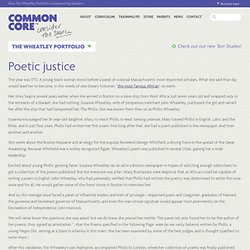
A young black woman stood before a panel of colonial Massachusetts’ most respected scholars. What she said that day would lead her to become, in the words of one literary historian, “the most famous African” on earth. Her story begins several years earlier, when she arrived in Boston on a slave ship from West Africa. Just seven years old and wrapped only in the remnants of a blanket, she had nothing. Susanna Wheatley, wife of prosperous merchant John Wheatley, purchased the girl and named her after the ship that had transported her, The Phillis.
Susanna encouraged her 18-year-old daughter, Mary, to teach Phillis to read. She wrote about the Boston Massacre and an elegy for the popular Reverend George Whitfield, a driving force in the spread of the Great Awakening. Excited about young Phillis’ growing fame, Susanna Wheatley ran an ad in a Boston newspaper in hopes of soliciting enough subscribers to get a collection of the poems published. Life in Colonial America. 1.)Begin the lesson by having students review what they know about the colonies.
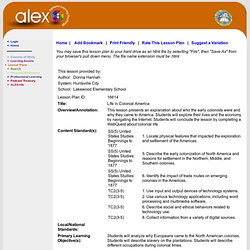
Have volunteers name each colony, locate it on a map, and give one fact about it. 2.)Give the following overview before continuing with the lesson: In the 1700s the population of the North American colonies grew as Europeans came to find a better life and Africans were enslaved. Ten million Africans were captured and shipped to the American continent. Www.americanheritage.org/AHEF_National_Middle_Extraction_08_2_AmericanHeritageThemes.pdf.
The American Revolution: Moving West And South. This lesson plan may be used to address the academic standards listed below.
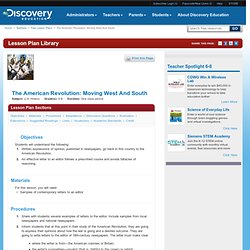
These standards are drawn from Content Knowledge: A Compendium of Standards and Benchmarks for K-12 Education: 2nd Edition and have been provided courtesy of theMid-continent Research for Education and Learningin Aurora, Colorado. Grade level: 6-8Subject area: economicsStandard: Understands that scarcity of productive resources requires choices that generate opportunity costs.Benchmarks: Understands that scarcity of resources necessitates choice at both the personal and the societal levels. Grade level: 6-8Subject area: geographyStandard: Understands how physical systems affect human systems.Benchmarks: Knows the ways in which human systems develop in response to conditions in the physical environment (e.g., patterns of land use, economic livelihoods, architectural styles of buildings, building materials, flows of traffic, recreation activities).
The American Revolution: Causes. This lesson plan may be used to address the academic standards listed below.
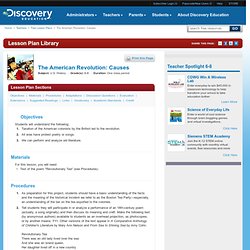
These standards are drawn from Content Knowledge: A Compendium of Standards and Benchmarks for K-12 Education: 2nd Edition and have been provided courtesy of theMid-continent Research for Education and Learningin Aurora, Colorado. The American Revolution: The Declaration And Beyond. This lesson plan may be used to address the academic standards listed below.
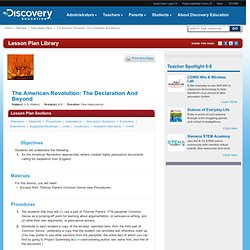
These standards are drawn from Content Knowledge: A Compendium of Standards and Benchmarks for K-12 Education: 2nd Edition and have been provided courtesy of theMid-continent Research for Education and Learningin Aurora, Colorado. Grade level: 6-8Subject area: civicsStandard: Understands the concept of a constitution, the various purposes that constitutions serve, and the conditions that contribute to the establishment and maintenance of constitutional government.Benchmarks: Understands the importance of political leadership, public service, and a knowledgeable citizenry in American constitutional democracy. Understands the major developments and chronology of the Revolutionary War and the roles of its political, military, and diplomatic leaders (e.g., George Washington, Benjamin Franklin, Thomas Jefferson, John Adams, Samuel Adams, John Hancock, Richard Henry Lee).
We The People: A History. Objectives Students will Identify the reasons the colonies fought the American Revolution.
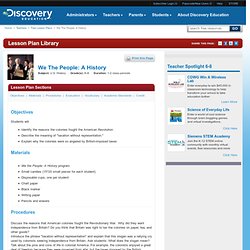
Describe the meaning of "taxation without representation. " Explain why the colonies were so angered by British-imposed taxes Materials We the People: A History program Small candies (15? Procedures Discuss the reasons that American colonies fought the Revolutionary War. Back to Top Evaluation Use the following three-point rubric to evaluate students' work during this lesson. Vocabulary colonyDefinition: A region politically controlled by a distant country; a dependencyContext: Seeing Spain grow rich from American colonies, France, the Netherlands, and England sought to establish their own colonies. democracyDefinition: Government by the people; exercised directly or through elected representativesContext: The government of Athens in ancient Greece was a democracy. protestDefinition: An individual or collective gesture or display of disapprovalContext: Taxes imposed by Britain sparked angry protests.
The American Revolution Center.